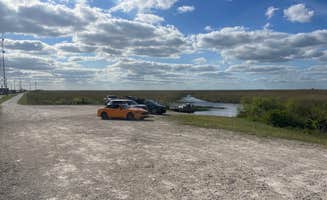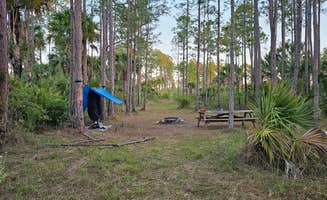Dispersed camping near Davie, Florida requires navigating Florida's limited public land options. The most viable free camping is concentrated in the western portions of the Everglades ecosystem, particularly in Big Cypress National Preserve. Access to these sites varies dramatically by season, with winter (November-April) offering drier conditions while summer months bring higher water levels, mosquitoes, and afternoon thunderstorms that can flood trails and campsites.
What to do
Waterway exploration: The L-31 Boat Ramp serves primarily as an access point for bank fishing and airboat launching rather than an ideal camping destination. "Bank fishing, no water, no services," notes camper Scott O.
Disconnecting from civilization: Panther Camp in Big Cypress National Preserve provides a genuine wilderness experience. Located 5 miles from the entrance on the Blue Trail, this site offers complete immersion in nature. One camper shares that it's a "great spot to disconnect. Primitive. Free."
Wildlife observation: The primitive camping areas throughout Big Cypress National Preserve function as excellent wildlife viewing locations, particularly at dawn and dusk. Prepare for possible encounters with alligators, particularly around water holes. Bring binoculars for bird watching, as the preserve hosts numerous wading and migratory species.
What campers like
Free access: Dispersed camping in Big Cypress National Preserve costs nothing, though permits are required. Carpenter Primitive Camp exemplifies this appeal, offering free wilderness camping along the Florida National Scenic Trail.
Space and solitude: The designated camping areas provide ample room for multiple setups. Panther Camp features "space for 10+ tents and hammocks" and is "large and maintained by the FTA," according to visitor reports.
Natural immersion: Campers particularly value the ability to escape urban environments. The contrast between metropolitan Davie and these primitive sites creates a compelling experience for those willing to make the journey and handle the lack of amenities.
What you should know
Access challenges: Trail conditions to primitive sites vary dramatically by season. "The trail in can be muddy depending on the time of year," notes a Panther Camp visitor. Winter months (November-April) typically offer drier conditions for accessing remote sites.
Water management: Surface water is available at some sites but requires treatment and comes with wildlife considerations. At Panther Camp, "there is a water hole in the back of the camp which can be filtered," but campers should note that "a gator generally lives there. Better to pack your water in."
Permit requirements: Ivy Primitive Camp and other Big Cypress sites require backcountry permits. These can be obtained through the preserve's website or visitor center, but enforcement varies. One camper mentions, "You can fill out a permit from the website. However I have never been asked for it."
Tips for camping with families
Choose sites strategically: For families considering dispersed camping near Davie, Florida, the primitive sites within Big Cypress National Preserve require careful planning. Consider the hiking distance (5 miles to Panther Camp) when determining if children can manage the trek.
Communications planning: Despite remote locations, some sites maintain cellular connectivity. Panther Camp offers "strong cell signal due to cell towers at the rest stop," providing an emergency communication option for families.
Wildlife safety protocols: Establish clear rules about approaching water sources where alligators may be present. Children should remain supervised at all times, particularly around the water holes commonly found near primitive campsites.
Tips from RVers
Not suitable for standard RVs: The dispersed camping options near Davie do not accommodate recreational vehicles. L-31 Boat Ramp has limited parking areas that might fit small campervans, but one camper warns about the location: "There are two places to park, but one of them is right next to the pump building and down a steep hill."
Alternative considerations: RV owners seeking boondocking opportunities should consider that L-31 receives mixed reviews, with one camper stating it's "not suitable" due to "extremely bright" lights from nearby infrastructure.
Day-use strategy: RV travelers can use established campgrounds at Long Pine Key or Monument Lake as bases while day-hiking to explore the primitive areas and trails within Big Cypress National Preserve.



